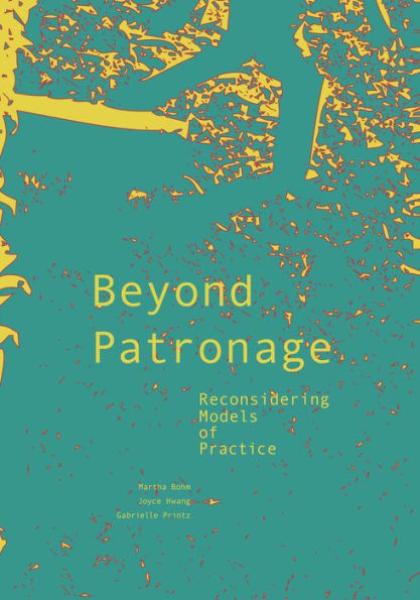Description
Essays, projects, and interviews will examine emerging forms of sponsorship, new forms of connectivity - technological or social - that produce innovative modes of collaboration, and strategies for cultivating relationships that allow us to rethink typical hierarchies between those in power and those in service. One could argue that the profession of architecture has traditionally been characterized by patronage. Throughout the twentieth century, private clients have enabled architects to develop and realize their most significant work. Today, the landscape of patronage is shifting. While the role of private clients is still central to the survival of the profession, an increasing number of architects and design practitioners are actively cultivating partnerships with not-for-profits, granting agencies, educational institutions, and other public organizations. How are these broader relationships redefining the role of patronage in architecture? Have our current economic, ecological, and political climates provoked architecture to confront its own priorities and assumptions? How can the practice of architecture be shaped not only through relationships of power, but also through strategies of empowerment? How are emerging practitioners today grappling with issues of inclusion and exclusion in the field?
Joyce Hwang, AIA, received a post-professional Master of Architecture degree from Princeton University and a Bachelor of Architecture degree from Cornell University, where she was awarded the Charles Goodwin Sands Memorial Bronze Medal. Since 1997, she has practiced professionally with offices in San Francisco, New York, Philadelphia, and Barcelona, Spain. Hwang is a Registered Architect in New York State and an Assistant Professor of Architecture at University at Buffalo, SUNY.
"The book explores how architects are already finding new niches and newly articulating roles other than service provider to a purchasing client. Among the activities discussed are innovation of new project models and business structures; researching hidden or obfuscated conditions for commentary and engagement; and reconsideration of who constitutes a "client" and what they must have to to offer. Work with nonprofits, public organizations, and with grant funding are discussed in terms of the impact they have both on society and on the architect's own artistic expression and intellectual contributions, and the intersection between architecture and artistic commentary is highlighted with attention to the impact of gender and other marginalized statuses." --ProtoView
"Coming out of the Buffalo School of Architecture and Planning's 2012 Martell Symposium, the book has three sections: "Architect as Initiator," "Architect as Detective," and "Architect as Advocate." Each section is structured with an introductory essay followed by contributions from architects and then interviews with them. These include Hansy Better Barraza's "Searching for an Authentic Production," Juliette Spertus's "Build It In: Making the Case for Garbage Collection in Urban Design," Lola Sheppard's "Navigating Territories of Engagement: Investigations in a Remote Territory." The symposium and book were a collaboration with the Gender Institute and the School of Architecture and Planning with the goal of "redefining contemporary architectural patronage and to highlight the important role that women have had and continue to play in expanding the profession's boundaries."" --John Hill, A Daily Dose of Architecture
"Informed and informative, instructive and insightful, exceptionally well organized and presented, "Beyond Patronage: Reconsidering Models of Practice" will prove to be a signal and important contribution to professional and academic library Architecture reference collections and supplemental studies lists." --Julie Summers, Midwest Book Review
Joyce Hwang, AIA, received a post-professional Master of Architecture degree from Princeton University and a Bachelor of Architecture degree from Cornell University, where she was awarded the Charles Goodwin Sands Memorial Bronze Medal. Since 1997, she has practiced professionally with offices in San Francisco, New York, Philadelphia, and Barcelona, Spain. Hwang is a Registered Architect in New York State and an Assistant Professor of Architecture at University at Buffalo, SUNY.
"The book explores how architects are already finding new niches and newly articulating roles other than service provider to a purchasing client. Among the activities discussed are innovation of new project models and business structures; researching hidden or obfuscated conditions for commentary and engagement; and reconsideration of who constitutes a "client" and what they must have to to offer. Work with nonprofits, public organizations, and with grant funding are discussed in terms of the impact they have both on society and on the architect's own artistic expression and intellectual contributions, and the intersection between architecture and artistic commentary is highlighted with attention to the impact of gender and other marginalized statuses." --ProtoView
"Coming out of the Buffalo School of Architecture and Planning's 2012 Martell Symposium, the book has three sections: "Architect as Initiator," "Architect as Detective," and "Architect as Advocate." Each section is structured with an introductory essay followed by contributions from architects and then interviews with them. These include Hansy Better Barraza's "Searching for an Authentic Production," Juliette Spertus's "Build It In: Making the Case for Garbage Collection in Urban Design," Lola Sheppard's "Navigating Territories of Engagement: Investigations in a Remote Territory." The symposium and book were a collaboration with the Gender Institute and the School of Architecture and Planning with the goal of "redefining contemporary architectural patronage and to highlight the important role that women have had and continue to play in expanding the profession's boundaries."" --John Hill, A Daily Dose of Architecture
"Informed and informative, instructive and insightful, exceptionally well organized and presented, "Beyond Patronage: Reconsidering Models of Practice" will prove to be a signal and important contribution to professional and academic library Architecture reference collections and supplemental studies lists." --Julie Summers, Midwest Book Review
Last updated on
Product Details
- Actar D Brand
- Jan 15, 2016 Pub Date:
- 1940291186 ISBN-10:
- 9781940291185 ISBN-13:
- 208 Pages
- 9.2 in * 6.5 in * 0.6 in Dimensions:
- 1 lb Weight:




